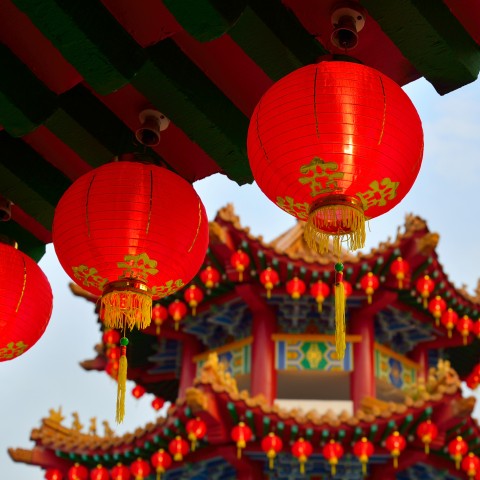Sometimes, a single sentence can allow humans to easily connect with each other, especially wishes phrases that everyone wants to hear. There are some unique life events, and different ways of celebrating them, in every single country even between the local people, and that’s where they share the same values and embrace each other’s traditions. So how do you wish someone well in Chinese? And what can you gain from learning how to say Happy New Year in Chinese, and other holiday greetings?
As a language learner, such events can establish a great communication channel with native speakers and provide a better look at the local culture so you can really be a part of it. In China, you can have a variety of opportunities to get involved, as long as you know the right thing to say. Now is the best time to learn those phrases of congratulations in Chinese that pave your way toward integrating into Chinese culture!
- Birthday
- Mid-Autumn Festival
- Chinese Congratulations: Graduation
- Lantern Festival
- Chinese New Year Congratulations
- Wedding
- Bad News
- Death/Funeral
- Injured/Sick
- Holidays
- Conclusion
1. Birthday
Undeniably, birthdays are one of the biggest events across all cultures! Traditionally, Chinese people like to eat longevity noodles, which is a type of noodle that’s all in one string. Nowadays, however, more and more people eat western birthday cakes. Now, imagine that you’re invited to a birthday party and don’t know how to say Happy Birthday in Chinese. How embarrassing is that? Don’t worry, though; the answer is here for you!
In Chinese: 生日快乐!
Pinyin: Shēng rì kuài lè!
In English: Happy birthday!
Usage: Natural for both speaking and writing; informal.
In Chinese: 恭喜你又长大了一岁。
Pinyin: Gōng xǐ nǐ yòu zhǎng dà le yī suì.
In English: Congratulations on growing a year older.
Usage: More natural for writing; formal.
In Chinese: 恭喜你又向成年迈出了一步!
Pinyin: Gōng xǐ nǐ yòu xiàng chéng nián mài chū le yī bù.
In English: Congratulations that you are one step closer to becoming an adult!
Usage: More natural for writing; formal.
2. Mid-Autumn Festival
Mid-Autumn Festival happens when there is a full moon.
Mid-Autumn Festival is another holiday where Chinese people like to unite together with their families. On the night of this holiday, the moon will be completely round. In ancient times, people appreciated the moon in an artistic way, which is why there’s so much Chinese old-style poetry about the moon during the Mid-Autumn Festival. The staple food for this holiday is called 月饼 (yuè bǐng), meaning “moon cake.” It looks round and golden like the moon, usually with a whole salted duck egg inside.
Eat mooncake and appreciate the moon with families!
In Chinese: 中秋节快乐。
Pinyin: Zhōng qiū jié kuài lè.
In English: Happy Mid-Autumn Festival.
Usage: Natural for both speaking and writing; formal.
In Chinese: 祝你们合家欢乐。
Pinyin: Zhù nǐ men hé jiā huān lè.
In English: Wish you a happy family.
Usage: More natural for writing; formal.
In Chinese: 你吃月饼了吗?
Pinyin: Nǐ chī yuè bǐng le ma?
In English: Did you eat a mooncake?
Usage: More natural for speaking; informal.
3. Chinese Congratulations: Graduation
Graduation means a whole new chapter in life!
Graduations in China are very similar to other graduation ceremonies. Students take pictures and wish each other a bright future. Despite celebrating academic achievements, people may shed some tears on their graduation, as it could be time to part with some of their close friends from school. One way to keep the beautiful memories alive is to sign each other’s uniforms.
In Chinese: 毕业快乐。
Pinyin: Bì yè kuài lè.
In English: Happy graduation!
Usage: More natural for writing; formal.
In Chinese: 祝你前程似锦。
Pinyin: Zhù nǐ qián chéng sì jǐn.
In English: Hope you will have a bright future.
Usage: Natural for both speaking and writing; formal.
In Chinese: 希望你毕业之后一切顺利。
Pinyin: Xī wàng nǐ bì yè zhī hòu yī qiē shùn lì.
In English: Hope everything goes well for you after graduation.
Usage: Natural for both speaking and writing; informal.
4. Lantern Festival
Let’s put on some lanterns for the Lantern Festival!
The fifteenth day of the lunar calendar is the Lantern Festival, a holiday that’s arranged very close to the Chinese New Year. On this special day, Chinese people eat 元宵 / 汤圆 (yuán xiāo / tāng yuán), a dessert made from glutinous rice flour, to celebrate. They also give each other riddles to solve with a theme associated with the holiday.
In Chinese: 元宵节快乐!
Pinyin: Yuán xiāo jié kuài lè!
In English: Happy Lantern Festival!
Usage: Natural for both speaking and writing; formal.
In Chinese: 我来给你出个灯谜吧。
Pinyin: Wǒ lái gěi nǐ chū gè dēng mí ba.
In English: Let me give you a riddle.
Usage: More natural for speaking; informal.
In Chinese: 祝您一家人团团圆圆。
Pinyin: Zhù nín yī jiā rén tuán tuán yuán yuán.
In English: Wish your family a great reunion.
Usage: More natural for writing; formal.
5. Chinese New Year Congratulations
When you see these, you know Chinese New Year is running right now!
Wondering how to say “Happy New Year” in Chinese? Well, you better know that if you’re studying Chinese, because the Chinese New Year is like Christmas in western countries. On this important holiday, people celebrate it by eating dumplings, visiting family, and lighting fireworks. If you ever want to be a part of Chinese culture, learn how to wish congratulations on Chinese New Year with some must-know phrases for the Chinese New Year!
In Chinese: 新年快乐,恭喜发财!
Pinyin: Xīn nián kuài lè, gōng xǐ fā cái!
In English: Happy new year, (I) wish you prosperity.
Usage: More natural for writing; informal.
In Chinese: 祝您万事如意。
Pinyin: Zhù nín wàn shì rú yì.
In English: May all your wishes come true.
Usage: More natural for writing; formal.
In Chinese: 我在这给您拜年了!
Pinyin: Wǒ zài zhè gěi nín bài nián le!
In English: Allow me to give you my new year’s blessing!
Usage: More natural for speaking; informal.
6. Wedding
Traditionally, Chinese couples wore red for their wedding. However, modern Chinese weddings are very similar to western wedding ceremonies. A special custom that Chinese people still like to do is to give 份子钱 (fèn zi qián), or “gift money,” to the newly married couple for a wedding. This Chinese congratulations gift is one of the defining aspects of a Chinese wedding.
What do you say at a Chinese wedding? Make sure to study the Chinese marriage congratulations below to have something to say when you’re invited to a wedding!
In Chinese: 新婚快乐!
Pinyin: Xīn hūn kuài lè!
In English: Happy new wedding!
Usage: Natural for both speaking and writing; formal.
In Chinese: 祝你们长长久久。
Pinyin: Zhù nǐ men cháng cháng jiǔ jiǔ.
In English: I wish you a long time together.
Usage: More natural for writing; formal.
In Chinese: 祝你们一生恩爱幸福。
Pinyin: Zhù nǐ men yī shēng ēn ài xìng fú.
In English: Wishing you a lifetime of love and happiness.
Usage: More natural for writing; formal.
7. Bad News
Of course, there are always dark sides of life as long as there are bright sides. Now that we’ve learned all the happy Chinese wishes phrases, it’s time to learn some comforting phrases to show your support when hearing bad news.
In Chinese: 一切都会好起来的。
Pinyin: Yī qiè dōu huì hǎo qǐ lái de.
In English: Everything will get better.
Usage: More natural for speaking; informal.
In Chinese: 节哀顺变。
Pinyin: Jié āi shùn biàn.
In English: Please save your sadness and let things slide (for someone’s loss).
Usage: More natural for speaking; formal.
In Chinese: 别难过了,有我在呢。
Pinyin: Bié nán guò le, yǒu wǒ zài ne.
In English: Don’t be sad, I’m here for you.
Usage: More natural for speaking; informal.
8. Death/Funeral
Death is an inevitable topic in every culture, China included. The Chinese have a holiday where people go to the graveyard of their dead families to clean the grave and awake the past family memories. If you ever accompany someone on this special holiday, or go to a Chinese funeral, here are some Chinese wishes phrases you can use for the dead.
In Chinese: 安息吧,你会永远在我们的心里。
Pinyin: Ān xī ba, nǐ huì yǒng yuǎn zài wǒ men de xīn lǐ.
In English: Rest in peace and know that you will always be in our hearts.
Usage: More natural for speaking; informal.
In Chinese: 一路走好。
Pinyin: Yī lù zǒu hǎo.
In English: Have a good trip.
Usage: Natural for both speaking and writing; formal.
In Chinese: 希望你在天堂一切都好。
Pinyin: Xī wàng nǐ zài tiān táng yī qiè dōu hǎo.
In English: Hope everything is good in heaven.
Usage: More natural for writing; informal.
9. Injured/Sick
We are all human, and we may get injured or sick once in a while. When we’re in such a vulnerable state, we need nothing more than a heartwarming wish from loved ones. Traditionally, staple foods for sick people are boiled chicken soup or some porridge; if you ever want to show your care beyond words, that’s the way to go. But for now, let’s first learn some basic Chinese phrases for condolences, such as “wishing you good health” in Chinese. Here are some phrases to show your friends and loved ones that you care!
In Chinese: 好好照顾自己。
Pinyin: Hǎo hǎo zhào gù zì jǐ.
In English: Take care of yourself.
Usage: Natural for both speaking and writing; informal.
In Chinese: 快点好起来啊。
Pinyin: Kuài diǎn hǎo qǐ lái a.
In English: Get well soon.
Usage: More natural for writing; informal.
In Chinese: 祝您身体健康。
Pinyin: Zhù nín shēn tǐ jiàn kāng.
In English: Wishing you good health.
Usage: More natural for writing; formal.
10. Holidays
More Chinese wish phrases? No problem! There are many more unique holidays in China that you may not know! For example, the Chinese traditional Valentine’s Day is on July 7, which originated from a romantic fairytale of the Weaver Girl. Now, modern Chinese couples like to celebrate Valentine’s Day on May 20 because the pronunciation of 520 in Chinese sounds very similar to “I love you” in Chinese. Holidays like April Fool’s Day are a huge thing in China as well. Many young people take advantage of this day to confess their romantic feelings for one another! Lastly, you’ll learn how to say Chinese Christmas greetings and happy holidays in Mandarin Chinese.
In Chinese: 情人节/七夕快乐。
Pinyin: Qíng rén jié /Qī xī kuài lè.
In English: Happy Valentine’s Day.
Usage: Natural for both speaking and writing; formal.
In Chinese: 愚人节快乐!
Pinyin: Yú rén jié kuài lè!
In English: Happy April Fool’s Day!
Usage: Natural for both speaking and writing; formal.
In Chinese: 圣诞节快乐!
Pinyin: Shèng dàn jié kuài lè!
In English: Merry Christmas!
Usage: Natural for both speaking and writing; formal.
In Chinese: 假期快乐!
Pinyin: Jiǎ qī kuài lè!
In English: Happy holidays!
Usage: Natural for both speaking and writing; formal.
11. Conclusion
Now, do you remember how to say “happy holidays” in Mandarin Chinese? How about Happy New Year or Merry Christmas in Chinese? This article certainly is a life-saver when it comes to being involved in life events. Now you don’t ever have to worry about being awkward during such occasions.
We’re dedicated to fulfilling every language learner’s needs. If you have any more questions about Chinese in store for us, visit ChineseClass101 to start an adventure in finding those answers. You won’t regret it!


















